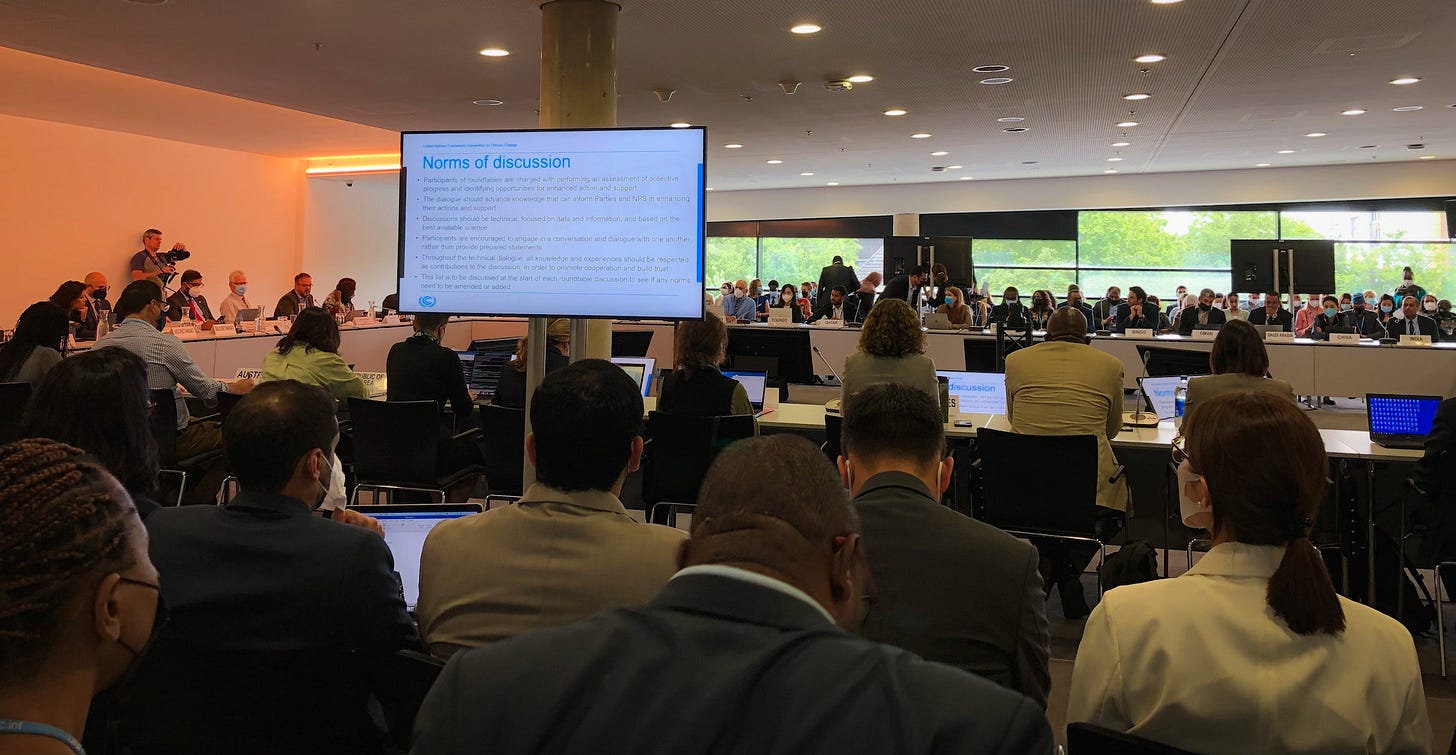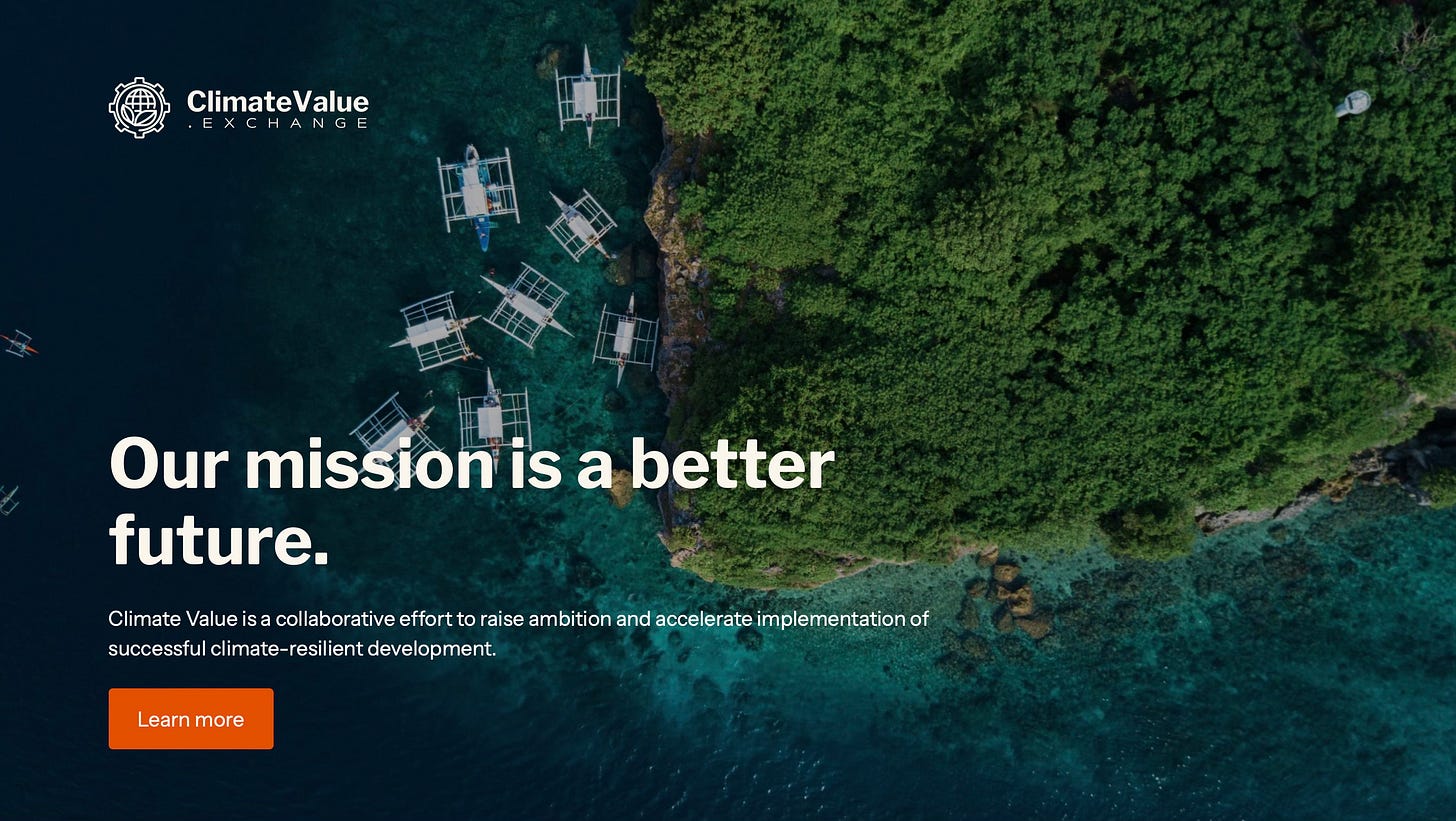Climate Value can make clean development mainstream
Climate Value is the missing ingredient in our economic, financial, and political systems. Because we do not properly account for rapidly increasing and compounding climate-related risk, we do not properly value operational resilience. This distorts what is seen as value creation—including how we gather evidence about value—and so it distorts what investors pursue as probable return on investment.
Even when we think long-term, where it is easier to build in values and impact considerations for major investments, the lack of detailed analysis of climate value—reduced risk, enhanced resilience, generalized climate-resilient development and locally relevant job creation—means destructive practices sill have an unfair advantage. Many investors choose to invest in pollution knowing this; others only see what the market tells them has value.
This year, we inaugurated the Climate Value Exchange. It is the culmination of years of work toward multidiemensional planning, data, policy, and analysis.
In 2014 and 2015, Citizens’ Climate staff and advocates worked to develop the PARIS Principles and to socialize them in the Carbon Pricing Leadership Coalition and in the process leading to the Paris Agreement.
In 2017, the Acceleration Dialogues produced a report on The Path to 100% Climate-Smart Finance—identifying the need for policies, practices, and financial arrangements that enhance the overall mix of both financial and non-fnancial return on investment across the whole economy.
That work led to the Resilience Intel initiative—emphasizing the need to integrate data systems, track all climate-smart finance, based on impact, and ultimately to establish a Resilience Value metric.
In 2019, the Acceleration Dialogues produced Invest at the Source—a report detailing how ocean-friendly investments across the whole economy can expand the “blue economy” and set us up for inclusive, climate-resilient development.
In 2020, Resilience Intel established the Principles for Reinventing Prosperity, and has since published landmark reports on the participatory Capital to Communities approach, and The Right to Resilience.
Last year, as negotiations around Article 6.8 of the Paris Agreement started to focus on multidimensional multilateral climate cooperation, we published a briefing note, tying all of this work together, including the need for vulnerability-sensitive financial reform.
Whether we call it Resilience Value, or Climate Value—or whether we develop a suite of operational metrics that draw from diverse data systems and scientific insights—this upgraded way of working will change calculations among investors in the public, private, and multilateral sectors. There are better options for creating everyday, mainstream economic value than skimming profits from global oil markets.
Cities know they need climate-resilient infrastructure in all communities. And, they need climate-resilient agriculture in the wider region—and across the world—to ensure food supplies are secure, diverse, health-building, and affordable. Recalibrating their own budgets, operations, and investment choices can allow cities to play a vital role in the evolution of food systems finance.
Insurers are starting to pull back from formerly lucrative markets, because climate disaster risks are too high. Even in wealthy areas in coastal communities or prone to wildfire, insurers are refusing to issue policies, because projected losses outweigh any contingent return on investment.
This is also starting to affect how businesses access credit, insurance, and other financial services. Government entities have a fiduciary duty not only to ensure they are not wasting money, but to ensure they do not invest in activities that destroy value across the whole of society. Financial regulators are warning that failure to prevent out-of-control climate disruption could collapse the economy.
Ahead of the Spring Meetings of the World Bank and International Monetary Fund, in April, we released a Climate Value note which examined rising costs, opportunities for multilateral cooperation, including through aligned climate income policies and food systems finance innovation, and recommended that intergovernmental negotiations take a serious look at how:
climate income can facilitate effective, efficient carbon pricing and emissions reductions, while spurring improved local economic activity;
food systems finance and related data systems and metrics can deliver new investment and more decent work to communities across the value chain;
non-financial returns on investment build foundational value, supporting improved financial returns, expanded job creation;
multilateral climate cooperation can turn trade relations into major breakthroughs in climate-aligned investment and development.
For the SB60 round of UN Climate Change negotiations now ongoing in Bonn, Germany, we issued a briefing note on non-market climate cooperation, which called for policy innovation, coordination across sectors, conventions, and regions, to make visible and to build Climate Value, which it defines as: “a measure of how well positioned the overall macroeconomy is to thrive, as conditions play out and compound each other’s effects.”

The SB60 briefing note adds that:
In a climate-disrupted world, with nature breaking down and watersheds and food systems deeply disrupted or collapsing, macro-critical (economy-shaping) resilience is low; in a world where Climate Value is stable and expanding, macro-critical resilience is higher—meaning greater financial AND non-financial returns on investment are available to private-sector investors and to public institutions, and to enhance the experience of everyday life.
The Earth Diplomacy Leadership workshops also produced a number of critical action insights for the Bonn negotiations. A few of the ones that align closely with the Climate Value imperative are:
Climate-smart economies are good for everyone. We need to evolve economies that meet human needs and aspirations. This is critical for the climate, but also for restoring trust in governance overall. Climate-degrading activities are degrading our ability to work together, to solve problems, both in the everyday and at planetary scale. Nations that make the shift more quickly to climate-smart, inclusive sustainable development will be stronger, more prosperous, more trusted, and more secure.
The structured phase-out of fossil fuels, through cooperative non-proliferation, enforced by local, national, and multilateral incentives and cooperative innovation and investment mechanisms, could be a critical tool for supporting the best-case future development strategy for most countries—especially given how late we are starting the process of overall mitigation of global emissions.
The Global Goal on Adaptation, in particular, has potential to become the signal high-ambition organizing target—if it is sufficiently ambitious. If nations agree that no person or ecosystem should suffer preventable harm due to human-caused climate damage, then all other areas of policy, investment, industry, and innovation, can be aligned to speed up the transition to climate-smart standards and practices.
Integrating climate-related insights into everyday decision-making will create the opportunity for climate-smart investments in small and medium-sized enterprises in rural and marginalized communities, diversifying and revitalizing those communities and helping to prevent the worst of unchecked climate change.
Next week, CCI and the Climate Value Exchange will convene the first Interparliamentary Exchange, focusing the attention of participating lawmakers and other officials and stakeholders on the urgent and cooperative work of building climate value into everyday experience. We have ahead of us a possible future of successful climate-resilient development; to live it, we will need all communities everywhere empowered to make pulling that better future together part of everyday economic and political life.




